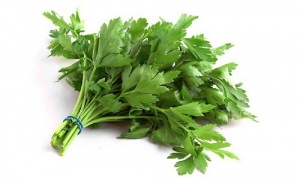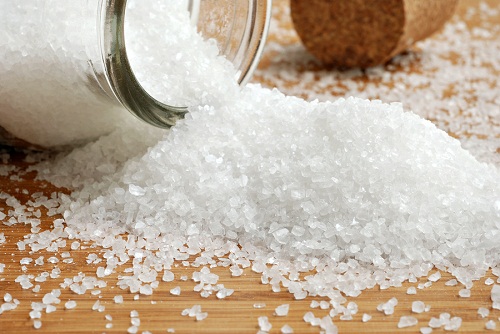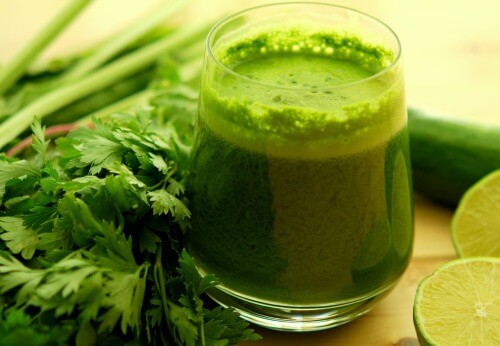How to Get Rid of Accumulated Salt in the Body

Salt is one of the most common spices in kitchens around the world, known for the special flavor it adds to every meal. But research over the years has shown that salt can have some serious negative effects on your health. What’s even more worrisome is that people tend to eat far too much of it. That’s why it’s important to learn about the effects for accumulated salt in the body.
While it’s true that your body needs some salt, or sodium, in order to function properly, that doesn’t mean you should consume too much of it. In fact, experts agree that it’s better to eliminate salt from your diet and get your daily sodium intake by eating other kinds of foods. And what about accumulated salt in the body?
If you eat too much salt, this can lead to some serious health problems over time. Some examples of these are heart disease and stroke. It’s also a major cause of fluid retention and swelling. Fortunately, you can kick the bad habit of adding too much salt to your food and free your yourself from the accumulated salt in your body.
How to remove accumulated salt in the body

- Drink more water: experts recommend drinking 6-8 glasses of water a day. Although it seems counterintuitive, drinking water stimulates the removal of excess fluid that’s retained in the body. In turn, you urinate more and remove sodium this way. This simple habit helps detox the body, including from accumulated salt in the body. It also keeps you hydrated and reduces swelling.
- Eliminate salt from your diet: salt is an indispensable ingredient in every recipe for many people. Nevertheless, you should start looking for alternatives that will add the same flavor to your food. You can still consume small portions of salt, especially with homemade meals. But bear in mind that there’s a high amount of salt in deli meats, canned foods, soups, frozen foods, and others. Instead of choosing these foods, start adding more fresh fruits and vegetables to your diet. These can help you eliminate excess accumulated salt in the body once you have digested it.
- Replace salt with other spices. It’s easier for you to remove salt from your diet if you can get used to healthier options. Garlic, fresh black pepper, curry powder, parsley, oregano, and rosemary are just a few of the good choices available.
- Get more physical exercise. You should get some kind of exercise every day that triggers the production of sweat. When you walk, dance, jog, cycle, or even go to the sauna, your body releases impurities and excess salt through perspiration. Just remember to always bring a bottle of water to your workouts.
Parsley can help remove accumulated salt in the body

Parsley is an herb that’s known for its ability to help cleanse the kidneys. What’s more, it’s able to and stimulate the removal of toxins by means of urination. You probably also know that the kidneys play a very important role in detoxing your body. They are the organs responsible for filtering excess salt out of the blood stream. This is in addition to their work getting rid of other toxic substances that get into your system.
How can parsley help?
To get the benefits of parsley for cleansing the kidneys, all you need to do is make a parsley tea. Collect a handful of chopped parsley leaves. Then add them to a liter of boiling water for 10 minutes. Once the tea is ready, drink it on an empty stomach. Keep any leftover liquid in a jar and store it in the fridge. You can drink this cold tea several times throughout the day.
…And remember!
- To get the most benefit from this tea, it’s important to combine it with the other recommendations above. Remember that it can only clean accumulated salt in the body if you drink it often.
- In addition to helping detox the body and remove excess salt, parsley tea is a great way to fight fluid retention. It can help prevent high blood pressure and even cooperates in weight loss. Of course all these things are possible if and only if you also lead a healthy lifestyle.
All cited sources were thoroughly reviewed by our team to ensure their quality, reliability, currency, and validity. The bibliography of this article was considered reliable and of academic or scientific accuracy.
- World Health Organization, Sodium intake for adults and children, 2012, ISBN 978 92 4 150483 6 (NLM classification: WB 424)
- Weinberger MH, “Salt sensitivity of blood pressure in humans”, Hypertension. 1996 Mar;27(3 Pt 2):481-90.
- Adler AJ, Taylor F, Martin N, Gottlieb S, Taylor RS, Ebrahim S., “Reduced dietary salt for the prevention of cardiovascular disease”, Cochrane Database Syst Rev. 2014 Dec 18;(12):CD009217.
This text is provided for informational purposes only and does not replace consultation with a professional. If in doubt, consult your specialist.








